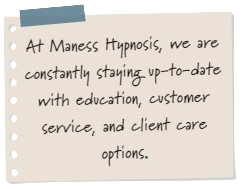
Dear Friend,
 If you are researching the best hypnotherapists, you are in the right place. Just like each person is different, hypnotherapy practices are different too. In your search to find the best hypnotherapist for you, you will discover that there are several options available. But, it is important to know that not all options are created equal.
If you are researching the best hypnotherapists, you are in the right place. Just like each person is different, hypnotherapy practices are different too. In your search to find the best hypnotherapist for you, you will discover that there are several options available. But, it is important to know that not all options are created equal.
At Maness Hypnosis, our mission is to empower you to achieve and maintain optimum mental health. This means getting in touch with your inner resources and practicing the skills that make you more resilient in the face of anxiety. Our vision is about changing lives, advancing the field of genuine clinical hypnotherapy, and supporting our community. There is no better reward than seeing the smiles on our clients faces after we help them feel like themselves again. To achieve our vision, and to help you choose the best hypnotherapist for you, I put this report together:
“The Top 10 Things You Must Know Before Choosing Your Best Hypnotherapist”
Mr. Sean Maness, MA, LPC
Owner of Maness Hypnosis
P.S. I hope you will enjoy this guide I put together for you. When you are ready to schedule your intake session, click the button below.


Beware of the non-clinical “clinical hypnotherapist”: The field of hypnosis is like the wild west in that it is unregulated. Anyone can call themselves a clinical hypnotherapist. The only requirement to becoming a hypnotherapist is it enroll in a hypnosis training program. Such programs usually include 100-500 hours of training.
That may sound like a lot, but it may surprise you that some of these programs can be completed in as little as two weeks. Upon graduating, hypnotists have no experience with paying clients, no supervision, and no ongoing support. They are on their own for better or worse. These programs will accept nearly anyone with the ability to pay the tuition. This level of training is called the non-clinical, or certification level of hypnosis.
This level encompasses the vast majority of practitioners who call themselves “clinical hypnotherapists.” Now, here’s where it gets complicated. Even if a practitioner possesses a certificate that reads “clinical hypnotherapist,” that certificate is not recognized by any regulatory agency in Texas.
In Texas, one that possesses a certificate in “clinical hypnotherapy” can practice hypnosis legally, but they must call themselves a “hypnotist” and only work with non-clinical issues such as smoking cessation and weight loss. However, many do not follow these rules since there is no regulatory body for unlicensed practitioners. Some hypnotists market themselves as clinical hypnotherapists anyway, greatly misleading the public in the process. This can make it more difficult to choose the best hypnotherapist for you.
What does it take to be an actual clinical hypnotherapist? A clinical hypnotherapist is a licensed therapist. Such practitioners are among the best hypnotherapists. The Texas Behavioral Health Executive Council is the licensing body for marriage and family therapists, counselors, psychologists, and social workers. All of these licensed therapists can practice hypnosis. Hypnosis is regulated under these individual licensing rules. Also, medical doctors and dentists can and do practice hypnosis. They are also considered clinical hypnotherapists.
At the licensure level (as opposed to the certification level), there are high quality hypnotherapy trainings available only to mental health professionals. An example of such a training program is the Milton H. Erickson Foundation in Arizona. There are only a handful of legitimate certifying bodies in clinical hypnotherapy, the most notable being the American Society of Clinical Hypnosis (ASCH).
Why is it important to work with an actual a clinical hypnotherapist? For issues such as weight loss and smoking, hypnotists can more than adequately meet your needs. Many unlicensed hypnotists are good practitioners. But, know what you’re getting. For actual mental health concerns such as anxiety, they do not have the experience to be the best hypnotherapist for you.
The educational and training differences between clinical hypnotherapists and hypnotists are huge. To be a clinical hypnotherapist, you need a master’s degree in a mental health field such as counseling, a 300-hour practicum which is part of that degree program, a 3,000-hour clinical internship, and clinical hypnotherapy training on top of all that. All of this comes with ongoing supervision. Compare that to someone with no degree in mental health and only two weeks of hypnosis training. To me, the answer is clear if you’re looking for the best hypnotherapist for you.
How do I know if my hypnotherapist is licensed? Two ways. Ask them if they are a licensed therapist. If they can’t tell you what kind of therapist they are or if they only talk about their hypnosis certification, they are probably a hypnotist. You can also check their licensure status on this website. If they are licensed, you’ll find them in the database.
A lack of specialization is a common problem with hypnosis practices. Browse virtually any hypnosis website and you’ll see the standard fare of specialties such as: weight loss, smoking cessation, sleep problems, public speaking, overcoming phobias and fears, improving learning, nail biting, and pain management.
Why it’s impossible to be a specialist so many areas: Many of these areas, such as pain management for example, are so broad that it would take years of study to become a specialist in that one area. Yet, so many hypnosis practices advertise lists very similar to this one.
A lack of specialization is also a problem in traditional therapy. Have you ever browsed Psychologytoday.com? Each therapist has twenty issues they help with. I’m exaggerating a little, but it does seem like everyone is a specialist in everything these days.
The correct way to establish a clinical specialty: Now let’s talk about the how a clinical hypnotherapist approaches a specialty area. The best hypnotherapist focuses on 1-2 main specialities.
They take the time to read the latest research, study the psychological underpinnings of the problem, learn the gold-standard treatments, integrate those treatments into clinical hypnotherapy, and finally, treat you, the client.
How to tell if your hypnotherapist is a specialist: First, look at their offerings. Do they center around one core area such as depression or anxiety? If so, they are probably a specialist. Also, look for membership to professional organizations.
For example, if your therapist is a member of an organization focusing on the treatment of a single clinical issue (like anxiety or depression), they are probably specialized, which puts them in the running for the best hypnotherapist for you.

At first glance, it might appear that every hypnosis business offers the same service. However, one of the things that separates non-clinical hypnosis and clinical hypnotherapy is the integration of gold-standard therapies.
Despite the word “therapy” being in the name, hypnotherapy is not a therapy. It is a technique. Think of hypnosis as an empty vessel that a qualified therapist uses to deliver their preferred form of therapy.
Most hypnotists use a collection of techniques that they apply depending on your presenting concerns. This is just technique, not therapy. And what if your concerns lie outside of your hypnotist’s set of techniques?
In order for your hypnotherapy experience to be therapeutic, your therapist must be well-versed in psychological theory. These theories explain human behavior, the causes of problems, the solutions to such problems, and what needs to happen to reach these solutions.
In addition to explaining the causes of problems and their solutions, some theories prescribe techniques. Still others describe the stance of the therapist (whether they are to be more directive or permissive).
The theory, techniques, and stance of the therapist all go together to create what is known as a form of therapy. The different types of therapy are also referred to as the therapist’s theoretical orientation. There are over 450 recognized types of therapy.
Not only must your hypnotherapist have a solid understanding of psychological theory, they must use gold-standard therapies specific to your presenting issue. For example, if you come in with anxiety, you would expect your therapist to use CBT since that is the gold-standard treatment for anxiety.
The most competent hypnotherapists will seamlessly integrate CBT and clinical hypnotherapy for your treatment.
Hypnotherapy can increase the efficacy of standard treatments. Research shows that when integrated with clinical hypnotherapy, CBT is more effective than when administered on its own. The best hypnotherapist incorporates the most issue-appropriate treatment into therapy.
If your hypnotist is unable to name a specific form of therapy they use with hypnosis, they are probably just using the technique of hypnosis, and not hypnotherapy. Additionally, some practitioners use NLP (Neuro-Linguistic Programming) with hypnosis. While this method can be helpful, NLP lacks the empirical validation of CBT and other evidence-based therapies. It’s considered an unproven method.
The best hypnotherapists have training specific to the issues they are treating. I recently saw a hypnotist website that advertised that they could treat anxiety and depression. Yet, under their bio, I saw nothing that indicated that they had received any kind of training on these issues. Make sure your hypnotherapist has received direct training on the issues they treat in additional to their hypnosis training.
Make sure your hypnotherapist has a track record of success on your presenting issue. Therapists should not only have training in the issues they are treating, they should also have a track record of success in this area. Sometimes online reviews can indicate such a track record. However, not all therapists have reviews due to the confidential nature of therapy.
If your therapist does not have reviews specific to the issue on which you are asking for help, ask them to tell you about clients they have successfully treated that had the same goal. Due to confidentiality, your therapist will not be able to describe these clients in detail. However, they can give you an overview and describe what they did to help.

Many hypnotherapists dive straight into hypnosis in the first session without taking the time to do a proper clinical assessment. Without a proper assessment, the therapist can’t give you vital information on your treatment. This includes estimating the length of therapy, giving you important information about the nature of your treatment, and estimating the total cost of therapy.
Not having a treatment plan is detrimental to therapy. Having no such plan makes it nearly impossible to identify what to target in hypnosis to make the therapy successful. This leads to inefficiency during the session, guesswork, and a lot of frustration for both your hypnotherapist and yourself.
Hypnosis works much better in the second session. After your concerns have been assesed in the intake session and a treatment plan created, you will not only be better informed about your treatment, the hypnosis and overall therapy will be more effective.
Find a hypnotherapist who does an intake session and treatment plan. Not only is this more professional, it will help make sure that your presenting concerns are a good fit for clinical hypnotherapy before you pay for an actual session, which is usually more expensive than an intake session.
The goal of hypnotherapy is to help you become more self-reliant in solving your own problems. However, many hypnotists who use outdated hypnosis actually do the opposite – they make you reliant on them. They are not trying to do this on purpose, they just have a fundamental misunderstanding of modern hypnosis.
Hypnosis is not mental programming. Many people believe that hypnosis is a form of mental programming. They think that it involves putting something in your mind to create change. However, this is false. Hypnosis can’t implant anything in your mind, nor would you want it to.
Modern hypnotherapy is about bypassing conscious limitations to access resourceful experiences. Let me give you an example. When I was starting my practice years ago, I was not feeling confident about selling my services.
When I did hypnosis, I got in touch with a childhood memory of riding my bike door-to-door selling items out of a catalog. I approached selling in a relaxed manner. I plainly stated why I was there, why they should buy from me, and asked for their order. Some bought and some didn’t. Overall, I felt confident in what I was doing.
After the session, I was able to bring those relaxed attitudes into selling my services. As a result, I began to feel more confident and signed up more clients. I never would have remembered this childhood experience without doing hypnosis.
Hire a clinical hypnotherapist who has an understanding of modern hypnosis. The best hypnotherapist will understand hypnosis in modern terms. If they explain hypnosis in terms of mental programming, they may not be using the most up-to-date methods.


Most hypnosis is sold as a miracle solution. Some hypnotists promise dramatic results in just 3-5 sessions. In reality, it takes time to change longstanding habits. How long you spend in therapy is largely a function of how long you have experienced the problem. Most issues can be significantly improved within 12 to 20 sessions (3-6 months). On the other hand, lifelong issues will take 1-2 years of therapy, whether or not you use hypnosis.
Many hypnotists claim that hypnosis is faster or better than other therapies. All modern therapies are equally effective provided they are used correctly and the client is a good fit for the modality. Hypnosis is one of many effective therapeutic tools in the field of psychotherapy.
Some hypnosis promotes behavioral compliance and not internal healing. Many hypnotists use direct suggestion to essentially tell you what to do. Let’s say this works and you do what the hypnotist suggests. How have you benefitted from that? The answer is you haven’t. You simply did what someone told you to do. You haven’t healed or changed internally in any way.
That means that you will quickly revert back to old behaviors shortly after discontinuing sessions. Choose a therapist that will help you heal on the inside as you change your behavior. A longer timeframe will support such internal healing.
Research says that medium to long-term therapy consistently outperforms short-term therapy. The entire therapy industry is becoming more short-term oriented. This is mainly due to insurance companies pushing for shorter-duration therapy which means greater profits for them. However, this usually comes at the cost of your results. People tend to change incrementally over time. This is actually a good thing because smaller changes tend to be more sustainable.
Hire a clinical hypnotherapist who offers a realistic time frame. Your best hypnotherapist will give you a realistic time frame. Unless the issue is truly benign, I would be skeptical of a therapist recommending fewer than 12 sessions. Research says that at least 20% of clients drop out of therapy early. Don’t let this be you if you want the best results.

If you have ever talked to a friend and realized they weren’t listening, you know what it’s like to be let down by someone’s lack of attention and care. Sadly, experiences like this are all too common in the presence of helping professionals who lack counseling skills.
Counseling skills are important across all helping professions. You might think that counseling skills only apply to counseling, but that isn’t the case. Whether the practitioner is a therapist, hypnotherapist, coach, teacher, or spiritual counselor, counseling skills are vital. Such skills are the raw ingredients of an effective therapeutic relationship.
The best hypnotherapist is one with good counseling skills. Research shows that it is the quality of the therapeutic relationship that is responsible for the majority of therapeutic outcomes. Most people assume that a hypnotist needs to be good at hypnosis in order to help you. But, it’s actually their ability to create a therapeutic relationship with you that is paramount.
You will know your hypnotherapist possesses counseling skills because you will get the sense that they understand you. You will feel at ease in conversation with them, even when you’re not doing hypnosis.
Many hypnosis certifying bodies have very loose standards when it comes to continuing education. Some require only a few hours to recertify every two years. It’s important for practitioners to continually update and refine their skills. The best hypnotherapists are always learning and adding to their skillset.

Do you find it challenging to speak up for yourself when something isn’t right? If so, please know that this is a common challenge. Therapists are often perceived as as authority figures who shouldn’t be questioned. This can make giving feedback even more challenging. Such situations are unfortunate because good hypnotherapy depends on both positive and negative feedback from you to keep your treatment on track.
The best hypnotherapists will empower you to provide feedback on every session. Not only will they ask for feedback on the session as a whole, they will ask if there was anything that didn’t fit during the hypnosis. Your honest feedback will go a long way towards making your hypnotherapy experience maximally enjoyable and effective.



Dear Friend,
 I hope this report has helped you learn more about clinical hypnotherapy and about the best hypnotherapist for you. To accomplish our mission of creating lasting positive change in the lives of as many people in the Dallas area as possible, we would be honored to meet you and learn more about how we can help you or a family member make a positive change.
I hope this report has helped you learn more about clinical hypnotherapy and about the best hypnotherapist for you. To accomplish our mission of creating lasting positive change in the lives of as many people in the Dallas area as possible, we would be honored to meet you and learn more about how we can help you or a family member make a positive change.
We simply want to answer your questions, address your concerns, and have you experience the finest hypnotherapy we can provide. In fact, it may even be possible that your initial assessment may reveal that you are farther along than you thought and need fewer sessions than most people.
We will share with you our recommendations based gold-standard assessment and treatment planning. If we are not the right fit for you, that is okay and we will assist you with a referral to the best hypnotherapist for you. While our award-winning hypnotherapy and client-centric approach may seem impressive…
We actually take pride in the fact that we are transforming lives every day. Obviously, there may be other things you should know before choosing your very best hypnotherapist for you. In fact, I am sure I could have easily doubled the length of this report. If you have questions, please schedule reach out to request a consultation. We are always here to answer your questions.
“The Top 10 Things You Must Know Before Choosing Your Best Hypnotherapist”
Mr. Sean Maness, MA, LPC
P.S I hope that you have enjoyed this guide and that you have found it helpful in selecting your best hypnotherapist!
When you are ready to schedule your initial consultation, simply click the button at the bottom to request your free consultation. To your mental health!
Visit: ManessHypnosis.com or Text 469-458-0187
